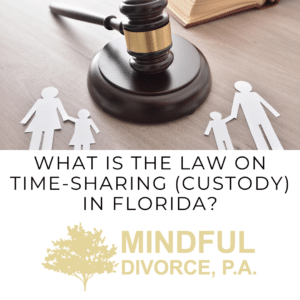 If you are a parent with a child under the age of 18, and you are contemplating divorce, time-sharing is an important matter for you.
If you are a parent with a child under the age of 18, and you are contemplating divorce, time-sharing is an important matter for you.
What Is Time-Sharing?
Time-Sharing is a plan that will govern the relationship between you and your spouse relating to how your children will spend time with each of you after the divorce. This is a written schedule that specifies the time, including overnights and holidays, that your children will spend with each parent. See Florida Statute 61.046(23).
What will the weekly and monthly calendar look like for your children?
This agreement should be customized to support the best interests of your children, and to fit the goals, principles and priorities of your family. There are minimum requirements for your time-sharing schedule, and for your parenting plan. These requirements are provided under Fla. Statute 61.13.
What Is the Law on Time-Sharing or Custody in Florida?
First, you should know that you and your spouse are the best people to create a time-sharing plan for your children. I know from many years of experience that this can be a difficult task. However, there is no question that it is a necessary task for you to accomplish outside of court.
You do not have to go down this road alone. My advice is to work with an expert that will help you craft a custom plan that meets the needs of your children and your family. Here is a link to more information on how to do this: Child Specialist in Divorce.
You and your spouse know your children, and their lives, better than anyone else. In my experience, the courtroom is the last place that you want to be to determine how and where your children will spend their time after your divorce.
If you cannot come to an agreement, after working with professionals to assist you, here is what the law says: There is a rebuttable presumption that equal time-sharing of a minor child is in the best interests of the minor child. See F.S. 61.13 (2)(c)(1).
This means that if you and your spouse do not agree as to what time-sharing will be for your children, the judge must start off the analysis with a presumption that a 50/50 time-sharing schedule is best for your children. Either you or your spouse may seek to rebut this presumption by proving that equal time-sharing is not in the best interests of the children.
There is a long list of factors that must be considered, argued and supported with evidence to properly present a time-sharing dispute to the Court. These factors are found at Florida Statute 61.13.
Again, my advice is to stay outside of court when addressing the private matters of your divorce.
This is even more important when it comes to legal issues that involve your children. You do not want to create lifelong scars for you, your spouse or your children.
Falling into a legal custody battle can certainly cause serious damage to your children and to your family.
I hope that this information helps you or someone that you know to resolve their divorce outside of court, with peace and respect.
If you, or a friend of yours, has questions about collaborative divorce in Palm Beach County, we are here to help.
Helpful Resources:
Mindful Divorce Services – Fixed Fees
Florida Academy of Collaborative Professionals






